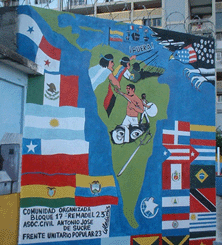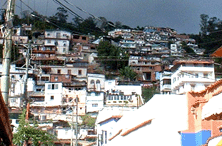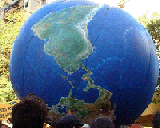
The Social Architecture of Caracas
One of the most noticeable attributes of the city of Caracas is the contrast between social landscapes. Even the highway that was until recently the main route between the airport and Caracas gave the traveller a distant view of the barrios, the Do- It-Yourself neighborhoods , labyrinths of houses piled on top of eachother, built into the hills surrounding the city. Now, with the closing of the bridge on that main highway, the new route, La Carretera Vieja, the old highway, actually, rumor has it, a route first constructed by the Spanish 400 years ago, travellers now have an even more impressive entrance to the city. After a winding climb into the mountains, busses and taxis descend precipitously into the heart of Catia , the largest barrio in Caracas and, Ben says, the largest barrio/favela/slum in Latin America. Since the road has only two-lanes, and can often only accomodate one bus at a time on the hairpin turns, traffic has been backed up for hours.




